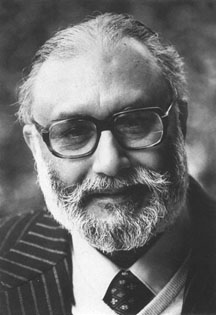| Abdus Salam  Born: 29-Jan-1926 Born: 29-Jan-1926
Birthplace: Jhang, Punjab, Pakistan
Died: 21-Nov-1996
Location of death: Oxford, Oxfordshire, England
Cause of death: Illness
Remains: Buried, Ahmadia Cemetery, Rabwah, Pakistan
Gender: Male
Religion: Muslim [1]
Race or Ethnicity: Asian/Indian
Sexual orientation: Straight
Occupation: Physicist, Mathematician Nationality: Pakistan
Executive summary: Electroweak Theory Pakistani mathematician and physicist Abdus Salam was born in Jhang when it was under British rule, and published his first scientific paper when he was 17 years old, addressing a previously unanswered mathematical riddle postulated by Srinivasa Ramanujan. He studied in his native Pakistan and at Cambridge, and after earning his doctorate he took work in Pakistan, where he faced two major obstacles. First, he was devoutly Muslim but a member of the minority Ahmadiyya sect, viewed as heretical by Muslims of other sects. Second and perhaps more pointedly, administrators at the two Pakistani universities where he worked had no interest or support to offer for his research. At the University of the Punjab, for example, he was assigned to coach the soccer team, and made to feel that his soccer duties were of more value to the university than his research.
Dissatisfied, he returned to England to teach and conduct his research in 1954, and in 1968 he introduced a theory of weak neutral currents, to explain the behavior and properties of elementary particles. He proposed that the electromagnetic force and the weak force are not distinct and separate, but two manifestations of the same fundamental force, which he called the electroweak force. By the mid-1970s other scientists' work had confirmed this theory, and in 1979 he won the Nobel Prize for Physics, an honor shared with with Steven Weinberg and Sheldon Glashow, who conducted independent but interconnected work. He was the first Muslim to win the Nobel Prize — except in his native land, where by an act of Parliament in 1974 his sect had been officially pronounced "not Muslim".
Salam was also the key organizer of the International Centre for Theoretical Physics (ICTP), with funding from the International Atomic Energy Agency, the Italian government, and the city of Trieste in Italy, where the facility was built. He served as ICTP's Director for thirty years beginning in 1964, and it was renamed in his honor after his death in 1996. Per his religion's tradition, he had two wives concurrently, and both were at his side at the Nobel ceremonies in Stockholm.
[1] Member of the Ahmadiyya Muslim Community ("Ahmadi Muslims", also sometimes referred to as "Qadiani"), a sect which believes that there may arrive a prophet after Muhammad. The Pakistani government has defined those holding such beliefs as non-Muslim.
Father: Chaudhry Muhammad Hussain (education official)
Mother: Hajira Hussain
Wife: (first wife, one son, three daughters)
Wife: (second wife, one son, two daughters)
High School: Government High School, Jhang, Pakistan (1940)
University: MS Mathematics, University of the Punjab, Lahore (1946)
University: BA Mathematics and Physics, St. John's College, Cambridge University (1949)
University: PhD Theoretical Physics, Cambridge University (1952)
Lecturer: Mathematics, University of the Punjab, Lahore (1951-54)
Fellow: St. John's College, Cambridge University (1951-56)
Lecturer: Physics, Cambridge University (1954-56)
Professor: Physics, Cambridge University (1956-57)
Professor: Theoretical Physics, Imperial College London (1957-94)
Administrator: Abdus Salam International Centre for Theoretical Physics, Trieste, Italy (1964-94)
Hughes Medal 1964
Atoms for Peace Award 1968
Matteucci Medal 1978
Royal Medal 1978
AIP John T. Tate Medal for Physics 1978
Nobel Prize for Physics 1979 (with Steven Weinberg and Sheldon Glashow)
Mikhail Lomonosov Gold Medal 1983
Copley Medal 1990
Pakistani Official Pakistan Science Council, 1963-78
Pakistani Official Scientific Advisor to the President, 1961-74
Pakistani Official Space and Upper Atmosphere Research Commission, 1961-63
Pakistani Official Atomic Energy Commission, 1958-74
Academy of Sciences for the Developing World Founder, 1983
Bangladesh Academy of Sciences Foreign Member
International Union of Pure and Applied Physics Vice President, 1972-78
Pontifical Academy of Sciences
Royal Society 1933
Stockholm International Peace Research Institute
Requires Flash 7+ and Javascript.
Do you know something we don't?
Submit a correction or make a comment about this profile
Copyright ©2019 Soylent Communications
|